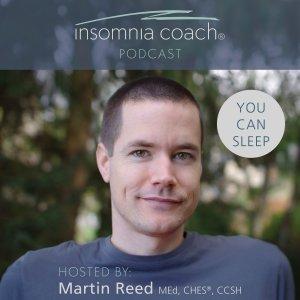Insomnia Coach® Podcast

A conversation about the challenges of CBT-I (and how to get through them) with clinical psychologist Steve Orma (#10)
Dr. Steve Orma is a clinical psychologist and specialist in the treatment of insomnia and anxiety. He is the author of the book Stop Worrying and Go To Sleep: How to Put Insomnia to Bed for Good, and he provides online treatment for insomnia and anxiety. Steve works with clients at every stage—from college students to new moms, entrepreneurs, top CEOs, and beyond. Everything he teaches his clients from stress management to conquering insomnia, he's studied, experimented and tested on himself. He has also been featured in the media in Entrepreneur Magazine, The Huffington Post, Women's Health, and Forbes. In this episode, we talk about how Steve got through his own insomnia using cognitive behavioral therapy for insomnia (CBT-I) techniques and the common challenges people face when implementing CBT-I techniques. The fact of the matter is that, in the short term, CBT-I techniques can be hard to implement — but if you are committed and consistent, your sleep will improve. My online insomnia coaching course will give you all the skills and support you need to enjoy better sleep for the rest of your life. Click here to get the course. Click here for a full transcript of this episode.Click here to hide the transcript. Martin Reed: Welcome to The Insomnia Coach Podcast. My name is Martin Reed. I believe that nobody needs to live with chronic insomnia and that cognitive behavioral therapy for insomnia (CBT-I) techniques can help you enjoy better sleep for the rest of your life. Martin Reed: All right, Steve, so thank you so much for being on the podcast with us today. Steve Orma: Yeah, absolutely, it's great to be here, Martin. Thanks for having me on. Martin Reed: Let's get started right at the beginning. How did you get interested in the field of sleep and insomnia in particular? Steve Orma: Yeah, so the way that I got into it is I had insomnia myself, probably like about six years ago now. I had been a psychologist already for several years and my specialty was anxiety and stress. I knew very little about sleep or insomnia because psychologists receive no training. I received zero training in sleep in my six years of graduate training and everything, which is also pretty common for medical doctors. It's kind of crazy and ridiculous. Steve Orma: I got this insomnia and it wasn't going away and it was pretty bad. I was suffering and I needed to solve this problem and because I didn't know anything about it, I just started researching it on my own. I read a lot of different books that were out there and just read everything and just looked for the best treatment. I was already familiar with CBT because that was the primary treatment that I used for anxiety was CBT. When I found there was actually a specific treatment for insomnia that used CBT, I was intrigued because I know it's a really powerful form of therapy. Steve Orma: I found really a book that I thought was really good and I modeled it after that book because it had a pretty good way to follow. I just put myself through the treatment. I mean, I did it all on my own. It's kind of like me. If I have a problem, I'm very motivated and I'll do it. It was hard. I mean, it's hard to go through the treatment. It was three weeks before I got any improvement at all and I was getting four to five hours of sleep a night maybe for six days a week, so it was pretty bad. Then, I started getting improvement and it ultimately... then it started getting better at that point and I started getting hopeful, but it took about eight weeks full... about eight weeks and then I was totally cured. Then, I was like, "Wow." Steve Orma: I saw so many clients dealing with anxiety and also seeing a lot of depression.






 Visit Podcast Website
Visit Podcast Website RSS Podcast Feed
RSS Podcast Feed Subscribe
Subscribe
 Add to MyCast
Add to MyCast